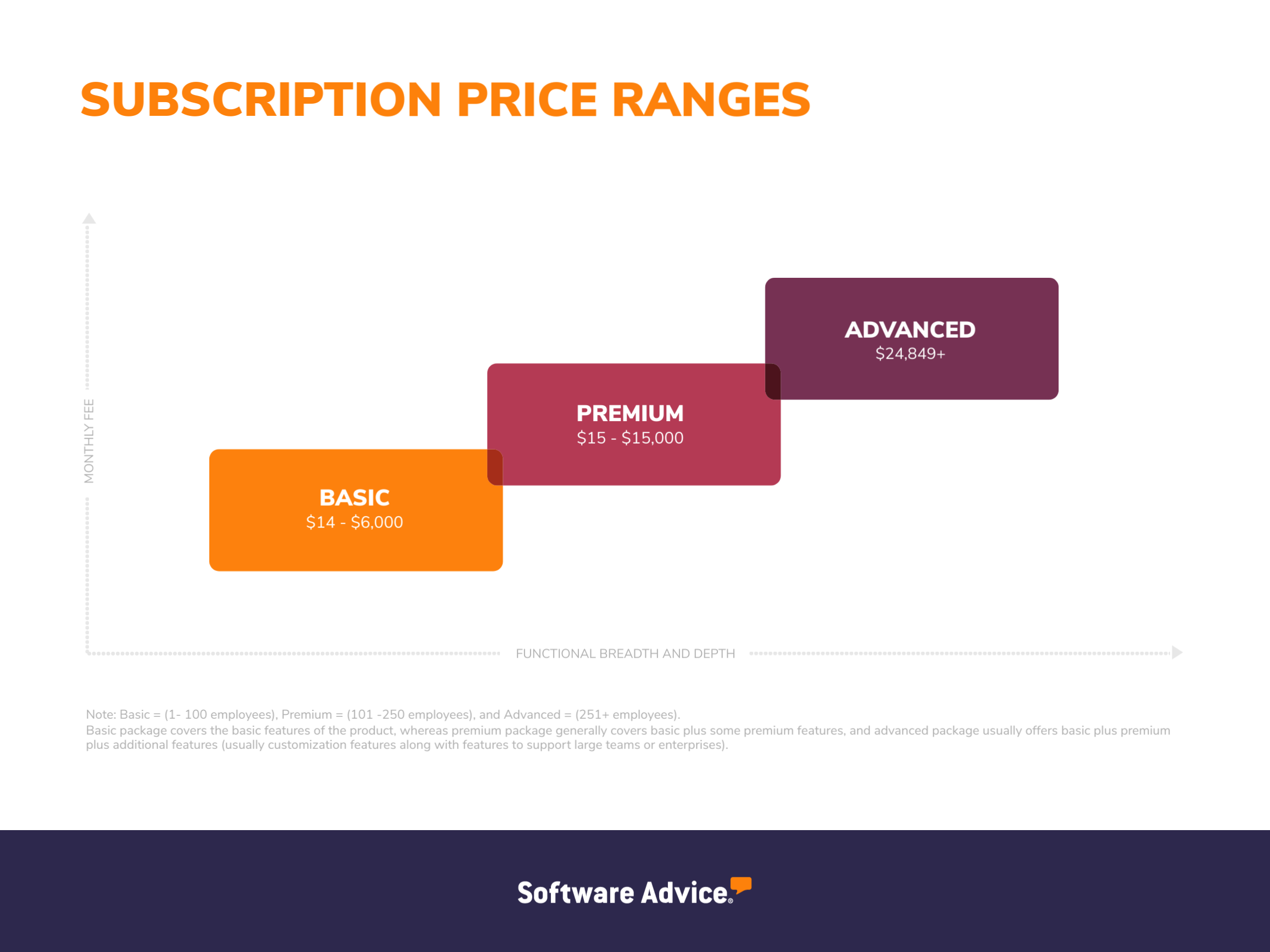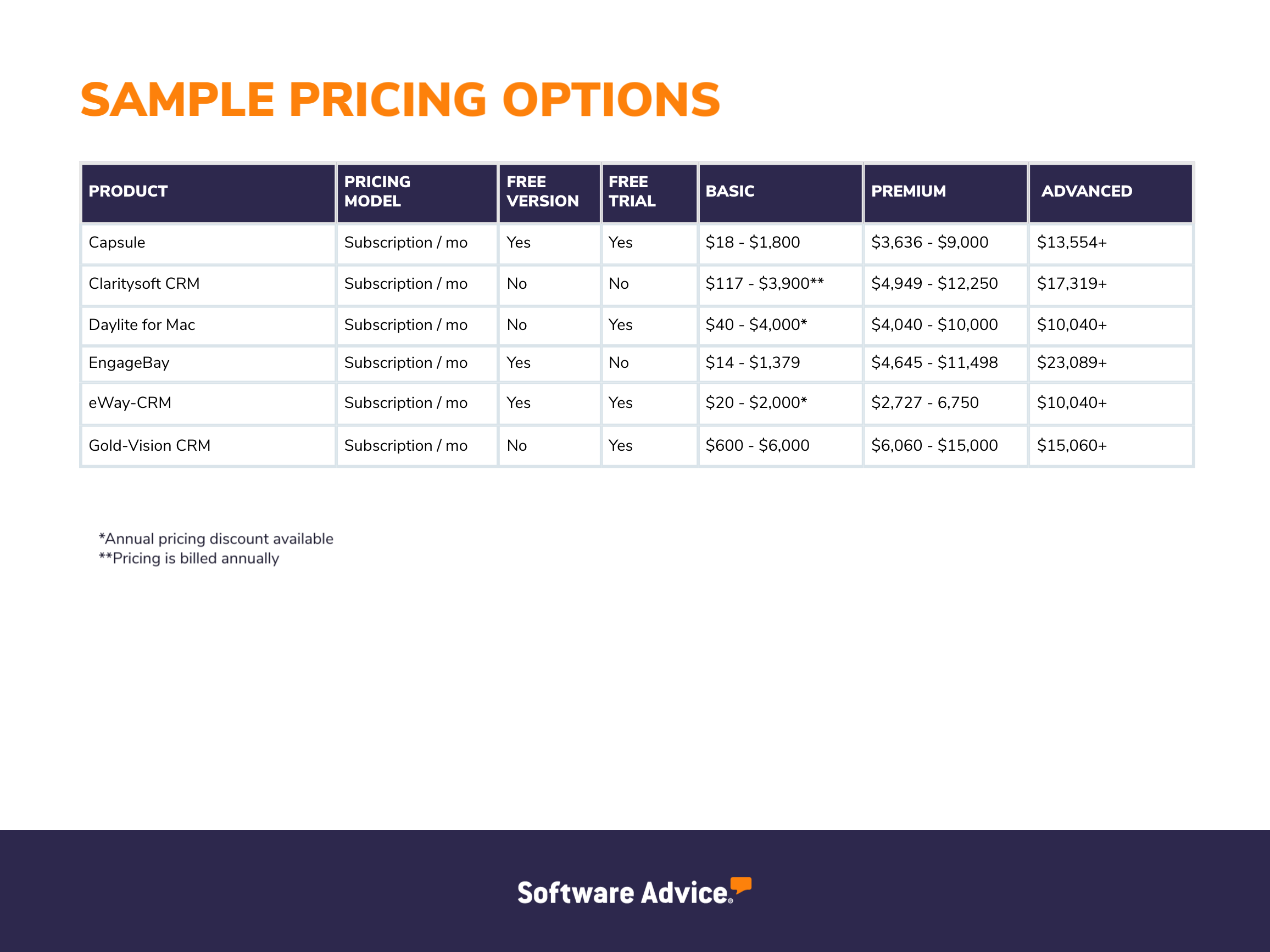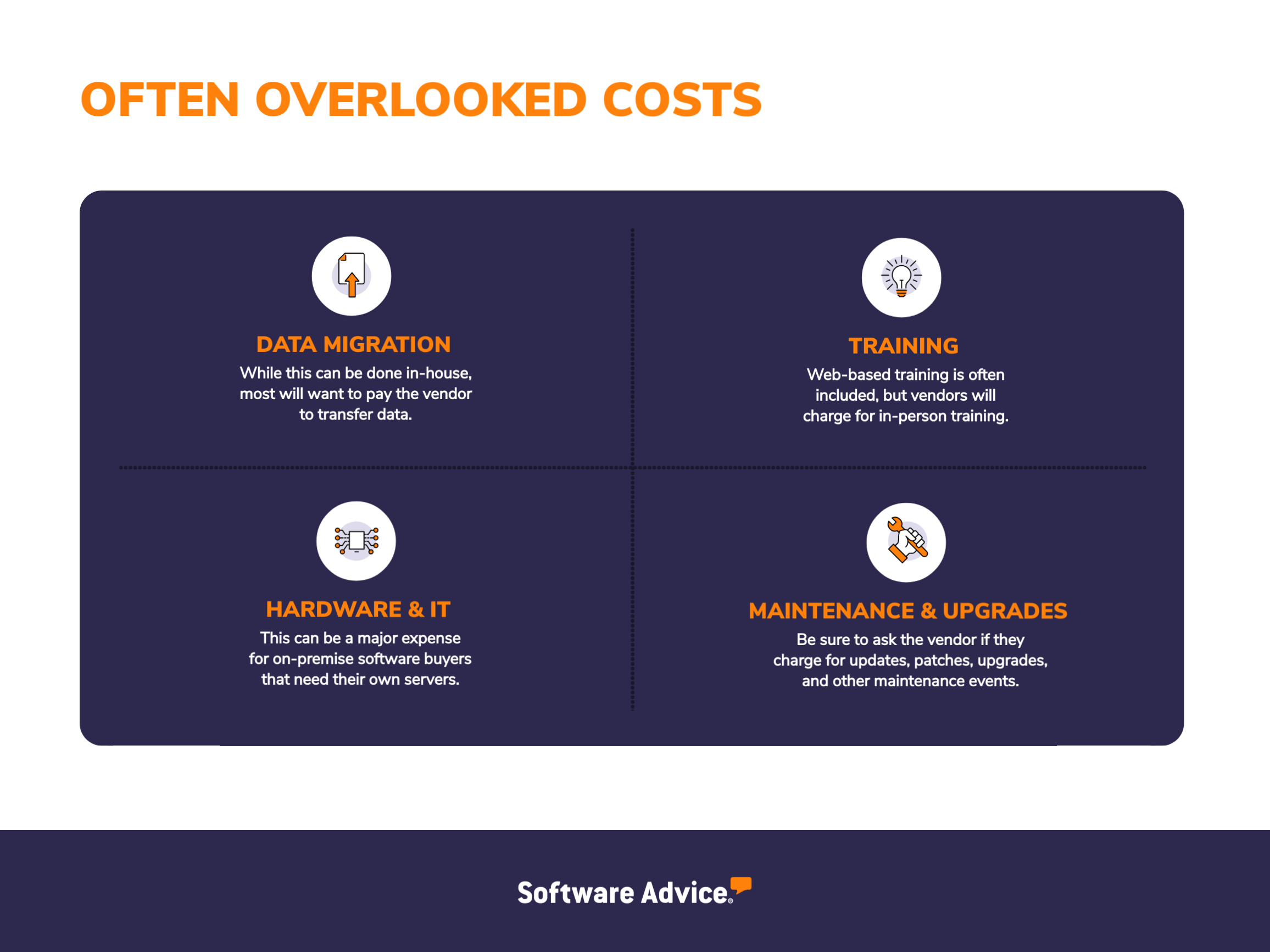A Guide to CRM Software Pricing Models
As a marketing manager, you may find multiple CRM solutions that meet your needs, but finding the right pricing plan is a challenge when limitations kick in. With the number of supported users, basic or advanced features, technical support options, and hidden charges, you have to consider multiple factors to make a decision.
Keeping these challenges in mind, we’ve put together this comprehensive guide to help you compare customer relationship management (CRM) software pricing models. This will help you determine which pricing plan meets your needs the best and explain how CRM tools are priced.
How is CRM software priced?
Customer relationship management software offers multiple pricing ranges typically based on the number of features offered in a particular plan. Factors such as the number of users, available storage capacity, and offered support options also influence the pricing ranges.
Types of CRM software pricing models
Customer relationship management software is most commonly available on a subscription-based pricing model wherein the users pay a recurring fee to the software vendor on a monthly or yearly basis. These subscription models are divided into different plans, such as:
Freemium: Offers a free version of the software to a small number of users or with a limited set of CRM features, typically catering to small businesses or small teams with basic CRM requirements.
Basic: Starting at $14 per month, this plan suits businesses with 1-100 employees. The basic plan offers features such as a landing page builder, web pop-ups, and text marketing.
Premium: The premium plan starts at $15 and goes up to $15,000. Serving up to 250 users, this mid-range price category offers more advanced features such as a website builder, landing page A/B testing, and a self-service portal.
Advanced: Costing $24,849+ and serving 251 minimum users, the plan offers the most advanced CRM features, including marketing automation, proposal analytics, online priority support, and Health Insurance Portability and Accountability Act (HIPAA) compliance.

For reference, below is a snapshot of the costs of some popular CRM software.

A note on features
Customer relationship management (CRM) software helps you manage current and potential customers’ data to have healthy customer relations. The tool allows you to track leads, send out marketing emails, automate sales tasks, track the performance of all marketing efforts, and much more. However, the tool must offer contact management, interaction tracking, and lead management as core features to qualify as a CRM software solution.
What are the upfront and recurring costs associated with CRM software?
Upfront costs are the expenses incurred while purchasing or subscribing to the software. These include licensing costs, installation expenses, and training costs. On the other hand, costs such as subscription fees and maintenance costs are called recurring costs because a user has to incur them on a monthly or yearly basis to continue to use the software.
Let’s look at upfront and recurring costs under the different CRM software pricing models before deciding on the software implementation.

Subscription license | Perpetual license | Free plans | |
|---|---|---|---|
Description | This is a monthly or annual fee that the users have to pay till the time they want to use the software. The pricing is mostly based on the number of users of the software in a month. | In a perpetual license plan, the users have to pay a one-time fee for a permanent license to use the CRM software. The amount of this license can vary depending on the number of users of the CRM tool. | Free plans offer the CRM tool free of any cost but only include basic customer relationship management features. |
Common uses | This kind of license is commonly used for cloud-based deployments, where the system is hosted by vendors on their servers and can be accessed on compatible devices over the internet. | Perpetual license is suitable for on-premise deployments, where the system is hosted and maintained in-house on the user’s own servers. | Free plans are more suitable for small business owners or sales or marketing managers with a limited budget and resources. |
Upfront costs | Installation and setup, customization of the software, and integration with existing systems are the most common upfront costs associated with subscription plans. | Upfront costs associated with a perpetual license are a one-time license fee, customization costs, and hardware (for example, server costs). | The only upfront cost in a free plan is the installation and setup of the solution. |
Recurring costs | Monthly subscription fees, starting from $14 per month, and premium support services such as live chat and 24x7 phone support are two common recurring costs in a subscription license. | Monthly, annual, or ad hoc maintenance (for example, updates, patches, and upgrades) of the solution and premium support offerings (for example, extended phone support hours) may lead to recurring costs under this license. | There are no recurring costs in a free CRM software plan. |
Hidden costs | Subscription licenses can have hidden costs, such as the cost to increase the storage capacity, create more automated workflows, or implement company branding. | Hiring IT staff or the salaries of the IT staff who will work on the maintenance of the CRM software can be a hidden cost associated with a perpetual CRM license. | Customization, integration with existing tech stack, training, and premium support options may be some associated hidden costs of a free plan. |
What are the additional fees associated with CRM software?
Understanding additional fees that you may have to incur while implementing CRM software is as important as understanding the various pricing models. These costs are common across vendors, and it’s a good idea to include them in your budget.

Data migration: If you already have a CRM tool and are planning to switch to a different tool, then the cost associated with data migration is an important factor for you. The process of data migration can be time-consuming, and you may have to consult an expert for data mapping and data integrity assurance. There may also be downtime during data transfer that may hamper your business. It’s crucial that you consider these aspects while you calculate data migration costs.
Training: If your staff is not comfortable with the CRM tool you implement, then they will not be able to use the tool to its full potential. Most software vendors offer support resources, such as a knowledge base, FAQs, and video tutorials, which can help you learn more about the technicalities of the tool. Analyze if these resources are sufficient for you or if you need additional training. This training will add to your cost but, in the long run, will allow your staff to work on complex tasks easily using the tool.
Hardware and IT: You may have to upgrade your servers to host the CRM tool on employees’ computers or mobile devices so that their devices support the technical requirements of the tool. You may also have to hire an IT professional to maintain the solution. Since these costs will increase your total spending on a CRM software solution, thoroughly analyze your current IT infrastructure before purchasing any CRM tool.
Maintenance and upgrades: Regular maintenance and upgrades of the CRM platform help avoid downtime or technical issues that may impact the business and keep the solution running efficiently. But these maintenance, upgrades, and patches may not be offered by the vendor in their license or subscription, and you may have to purchase them separately. Alternatively, you can hire an in-house IT manager for the maintenance of the tool. Analyze both options to understand which is better for you in terms of cost.
How to find the right CRM software price range
Assess your business size. Small and midsize businesses don’t often have the budget to invest in advanced or premium versions of the CRM tool. In such a case, they can benefit from free or basic versions of the tool that offer a basic set of CRM features. However, if you’re a big business and have the budget, you can always go for a premium version of CRM software which offers an advanced set of features. Therefore, based on your business size and budget constraints, you can choose an appropriate pricing plan for the CRM system for your business.
Analyze CRM features. As discussed above, different pricing models offer a different set of features, wherein higher-priced plans offer advanced features such as marketing analytics, unlimited contacts, and phone support. However, you don’t always need these features. If you’re a small business, a basic plan with basic features, including email marketing, a lead grabber, and a help desk, will fulfill your CRM needs. Therefore, thoroughly analyze the CRM features you need for your business to run effectively. Identifying these features will allow you to make a thoughtful decision and choose the right CRM pricing model.
Check the number of users. The number of users a CRM platform can support influences the pricing range. Just like features, higher-priced models support a higher number of users. Therefore, if you have 100-250 users, you can go for a basic plan. But if you have more than 250 users, you must go for a premium or advanced pricing plan.
Common questions to ask when choosing a CRM software pricing plan
Does the tool have a free trial or demo version? A free trial or demo version of the CRM solution allows you to test the features and functionality of the software for a certain amount of time. Most vendors offer a 14-day or 30-day trial. Check with your vendor if they have such an offer on their CRM pricing model before purchasing.
Are there any additional costs for integration or employee training? As discussed above, software integration and staff training often lead to additional costs. Before you make any investment, it is important that you understand the extent of these costs that you may have to bear. Ask your vendor about the customer support resources they provide in each CRM pricing model that can help your staff understand the tool. Also, understand how many third-party tools their software can integrate with and what is the process of integration.
Are there any hidden costs? Just like additional costs, there can be hidden costs too, which are crucial to check beforehand. Data migration is one aspect that you should look into for hidden costs. As migrating data can not only lead to extra costs but also hamper your business operation, it is important to thoroughly understand its impact on your business before you commit to any CRM system.
Find the best CRM software packages
Do the CRM tools listed in this guide fall within your software budget? If so, compare their features and read real user reviews of more than 1,000 similar products listed on our CRM software category page.
Sources
The products in this guide qualified for the most recent FrontRunners for CRM and were highly rated by users. Only products with publicly available pricing information were included in this table. We summarized publicly available pricing sources, including vendor websites as of February 2023, beginning with the lowest monthly pricing (not including annual discounts) for packages that include the core functionality for a software category. We list pricing for more advanced packages (per user, when available) that include the core software feature(s). Your company’s needs may differ, and final pricing may vary.
Note: This article is intended to inform our readers about business-related concerns in the U.S. It is in no way intended to provide financial advice or to endorse a specific course of action. For advice on your specific situation, consult your accountant or financial consultant.